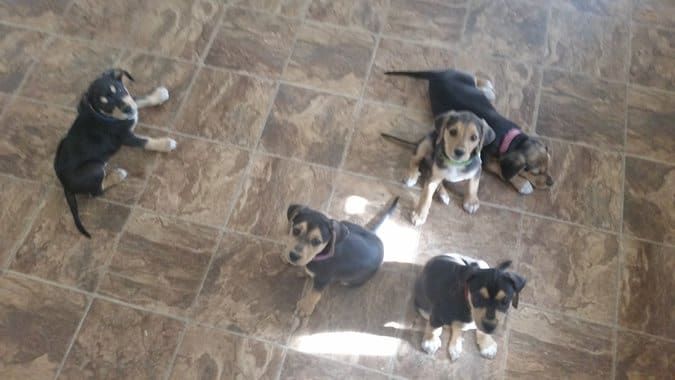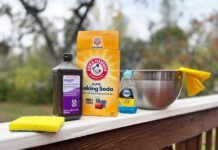
I know that all of my blog posts have been about puppies or puppy care or puppy food lately. Thats because Ive been overrun with puppies since September 10th, when I agreed to foster six too-young puppies that were brought into my local shelter. Taking care of them has been a challenge, because neither my house nor my office was really set up for puppy care (though they are now), and because if you want to raise them right, puppy care and training takes a lot of time and energy. I havent spent so much time with so many puppies since I was a little kid; my parents were animal lovers, but they also were also completely inexperienced with and ignorant about the needs of animals and responsible animal care and control, and so we were forever looking for homes for litter after litter of accidental puppies. But despite the investment of time and money! I spent on my foster pups, overall it was a great experience, one that underscored quite a few things Ive learned over the years that Ive edited Whole Dog Journal. Allow me to share some of the bullet points with you.
-
Good food makes a huge difference. When I got the puppies, they were in rough shape. They had big, round bellies full of worms. Their coats were rough and aside from the bellies, their body condition was poor. I started them out on really good quality canned food, to which I added puppy formula (milk replacer). When they all developed the inevitable respiratory infections that pretty much all puppies at the shelter come down with, and were started on antibiotics, I added a goat-milk-based probiotic/digestive enzyme supplement (Pro Bloom made by The Honest Kitchen) to their daily regimen. That helped them handle the antibiotics and their poop went from goopy, disgusting messes to nice firm poops within a few days. When they were about 8 weeks old, I started offering them a quality kibble, and left some in their bowl to snack on between the canned-food meals. Of course, the deworming helped, but I think the top-quality food really helped improve their health and coat quality.
(It also cost a small fortune. The canned food I fed them cost $3 a can; they were eating 3-4 cans a day. The Pro Bloom is $24 for 16 packets, and I fed them one packet a day for about a month.)
-
Good management gear makes everything easier. I cant imagine raising puppies without baby gates, exercise pens, and crates to keep them out of stuff they shouldnt get in and safely enclosed where you want them. I bought one exercise pen on the day I brought the puppies home and it was so helpful I bought another within the week, so I had two safe environments to keep them in. That way, I could release them from one pen and feed them in a clean pen; Id clean the first pen while they ate, then take them outside to potty and put them back into the first pen.
-
Socialization is critical to raising a well-adjusted dog. These pups were handled by everyone I knew who wanted to meet them. My son and his (young men) friends played with them endlessly. My two-year-old grandson romped NEAR them (but didnt actually enjoy being mobbed by them, and I was worried about his stepping on one, so they played on opposite sides of the x-pen). My girlfriends stopped by to visit a lot more than usual. A friend brought over her elderly aunt, who used to raise German Shepherd Dogs but now has dementia. She spoke to them in German and had to be physically prevented from bringing one home. I showed everyone how to ask them to sit, and they were reinforced with treats, praise, petting, and attention. Because they had such frequent, varied, and uniformly enjoyable (not stressful) experiences, they readily approached any human confidently, happily, and without going over the top with frantic energy.
-
Its never too early for training. From the beginning, when the pups were just tiny (they were estimated to be about 4 ½ weeks old when I got them), I rewarded any puppy any time I saw him sitting. Id bend down and rub him, feed him a little treat (I used tiny cubes of Natural Balance roll or bits of cooked chicken when I had recently made some), or toss him a toy. Id make eye contact and say Youre such a good boy! As a result, by the time they were six weeks old, I could get the entire group to sit quietly and watch me on cue a feat that did not go unnoticed on the occasions when I took them back to the shelter for vaccinations (and continued deworming boy, were they full of worms). The veterinary technician who administers most of the healthcare wasnt surprised by their behavior on these occasions (I have also taught the shelter volunteers how to teach the shelter wards how to sit politely in front of their kennel doors) but she was impressed by the six little guys lined up on the floor of her exam room, waiting their turns for shots (and treats). On the day I brought them to the shelter for neuter surgery, immediately prior to their being made available for adoption, even the shelter director noticed how quietly and calmly they were in the recovery room cages before and after their surgeries; all the rest of the puppies who were being spayed or neutered that day cried and whined and pooped and whirled in the poop in their cages. But my pups were used to being crated at night and intermittently for short periods during the day, and were calm (and kept their cages clean).
All of the puppies got adopted very quickly. I agreed to hold one for 10 days past the adoption date because the adopter was going on vacation the day after she met the puppies (a friend heard she was considering getting another dog and brought her to my house), and one of the others for 20 days past the adoption because the adopter, a lovely young woman, was still in escrow on her first home. She has since closed and is moving in and will pick up her puppy this coming weekend, when everything is in place to keep him well-managed. Shes come by to visit with him and is doing a great job of preparing for his care and training. Its been fun spending time with him on an only-puppy basis it really sped up his training and good manners to be around only my well-behaved adult dogs this past week, instead of spending 24/7 with another rowdy puppy. I admit I will miss him (and all the puppies), but boy, oh boy, am I looking forward to spending time with ONLY my adult dogs.






